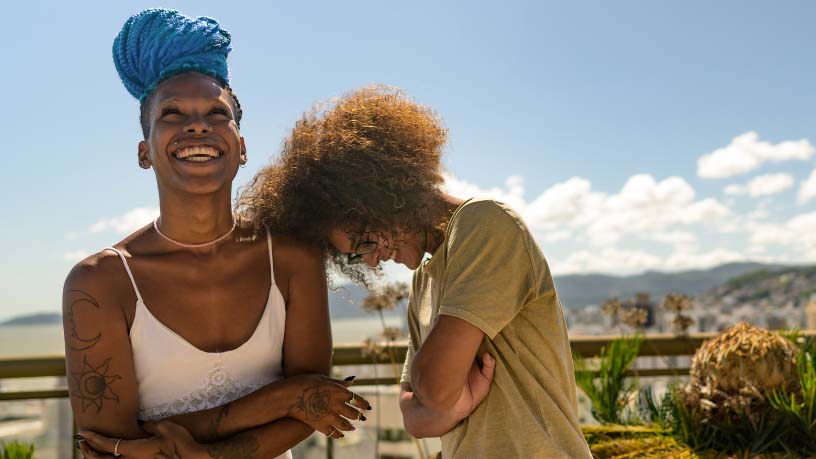There is no best way or time to come out. Do it on your own terms.
Key takeaways
Make sure you have a network of support such as friends or a local or online LGBTQIA+ group.
Take your time in coming out. Do it when and if it feels right for you and your safety.
I knew I was gay from a really young age, but it was something I kept hidden for a long time.
We live in a very heteronormative, cis-centric world, so coming out can be a confusing thing. The messaging we’re surrounded by almost gaslights you into thinking ‘I am cis (cisgender) and straight’, so anything outside of that can be hard to navigate.
For me personally, coming out was a journey. I took on a lot of different identities and went through a lot of different internal feelings before landing where I am today: a very proud gender queer lesbian. But I'm also open to that changing and evolving. I don't think coming out or anyone’s queer journey is linear and straightforward.
To anyone who thinks they might be queer, I say embrace it and let it evolve. You’re on an exciting journey. Enjoy it, because coming out looks different to everyone.
Ask yourself: Is it safe for me to come out?
I think the biggest thing to consider when thinking about coming out is whether it is safe for you.
That means doing a risk assessment, thinking about the environment you’re in and whether you have support systems in place.
[Kathleen Ebbs sits in front of a wall]
Kathleen: Hi, my name is Kathleen Ebbs. My pronouns are they/she. I am partnering today with Bupa to talk about coming out.
I would like to acknowledge the Wurundjeri people, the traditional custodians of this land in which this series is filmed, and I pay my respects to elders past, present and emerging. Always was, always will be Aboriginal land.
[Text on screen: How do I know if I’m queer?]
I think if you're thinking about whether or not you're queer, you very well could be.
We live in a very heteronormative, you know, cis centric world, so coming out can be this kind of like confusing thing because the messaging that you're constantly surrounded by and almost, like, gaslit into thinking is that ‘I am cis and straight,’ so anything outside of that can be confusing and hard to navigate.
I know for me personally, coming out was a journey, and I took on a lot of different identities, and went through a lot of different internal feelings, and you know landed on today I'm a very proud genderqueer lesbian, but I'm also open to that, kind of, changing and evolving because of the way society is constructed.
I don't think coming out or someone's queer journey is linear and straightforward. So I think, you know, if you think you are, you probably are. Just embrace that and let it evolve; it's exciting! You're on a journey and enjoy it, embrace it.
[Text on screen: Should I come out to my parents or guardian, and how should I do it?]
Coming out looks different to everyone. I think the biggest thing to consider when thinking about coming out is definitely risk assessment.
So whether it is safe or not for you to come out. Whether that be that the environment is not set up or that you don't have the proper support systems in place for when you do decide to do that.
So I think the first thing to always consider is whether it is safe or not for you to come out.
If it is safe you for you to come out, my biggest tip would be creating some sort of support system for yourself on that journey. Whether that be a trusted friend, peer, family member or maybe a support system. There’s many different beautiful organisations that can create those systems for you.
Once you have that, I think it helps alleviate the pressure in the coming out, if the person or people you are coming out to are not yet ready to hold space for you, you know you have a reliable source to go to in the meantime to hold space for what you're experiencing.
It's also always important to remember that there is no rush in coming out.
Whether you are out or not, it doesn't change your gender, sexuality… it doesn’t change your queerness at all.
So, take your time with it, and make sure you know you have the right support system around you. Don't rush it; it's your personal journey. You don't owe that to anyone else.
[Text on screen: I feel like if I come out people won’t take me seriously or think it’s just a phase. Is it better to keep quiet until I know for sure?]
I think in terms of people not taking you seriously or some gatekeeping that can go on within queerness, again firstly it’s important to assess risk.
So, whether it’s important not to be outwardly queer because of your safety.
But, if the only reason to you not coming out is that you think people won't take you seriously or that you're not queer enough, I say screw that and definitely come out.
There's no one way to be queer, and I think personally that is something that I still experience now as someone that is very comfortable in their sexuality and gender and has done a lot of work on myself.
I’m also a very active member of the queer community and even I go through times and have thoughts and feelings that ‘I’m not queer enough, I’m not allowed to take up space’.
But honestly that just comes from again living in a very heteronormative, cis centric world, where we are taught that there's only one way.
I think too society likes to put people in general into boxes and categories, and when you do come out, you might still be figuring out where you fit on that spectrum.
But as you’re figuring that out, there’s all this noise of people being like, you need to make a decision and stick to it, but you might not be ready to do that. You might never be ready.
I'm open to changing within my queerness because I know that it's a journey that will be forever, because of the world and the social constructs in which we live in.
So I would say if you're feeling the pressure or that you're not queer enough or you haven’t quite decided where you fit on the spectrum, or you’re worried that it is just a phase, screw that!
It's a journey. Enjoy it, and anyone that wants to gatekeep your queerness is probably just projecting their own insecurities onto you. So to that, we say ‘Tata’ and live your life.
[Text on screen: What happens if I change identities after coming out?]
I think we need to normalise changing identities after you come out. Especially, a lot of queer folk like myself come out during adulthood, and I feel like when you grow up without a language to how you're feeling, so instead you shape shift into what society tells you should be feeling and presenting like and identifying as.
And then you're introduced to queerness and people that have similar experience to you, and all these different, you know, words and languages and ways to identify, it's really exciting, but it can also be really confusing, and there is a lot of change that goes on.
Again, for me personally, I came out identified as bisexual, then pansexual, and now I'm a proud genderqueer lesbian.
That could change again. I'm open to that. I don’t know.
But I think if someone wants to put you in a box and make you stay there, and you feel pressured to do so, it's again just society’s constructs and heteronormative ways playing out, and that is the opposite of what queerness means and the exploration that occurs within our community.
So, I think it’s really important to normalise being able to change identities and it's also very okay to change your mind and change how you choose to identify the more you learn about yourself and the more you come into your queerness.
[Text on screen: What is the best way an ally can support the LGBTQAI+ community?]
The best way allies can support the LGBTQIA+ community is to listen, learn, and engage.
Whether that be on the internet or on your television screens or in your personal life.
Hearing our stories and hearing about the issues that affect us is really important.
I think too, as an ally, it's important to educate other people on the issues that surround our community and make sure that you're using your voice for good.
It's really important for allies to use their privilege in order to bring queer stories to the forefront. There's a lot of issues that affect queer people, and unfortunately, we live in a society that does not put our stories, our experiences, and our rights at the top of the list.
So, if allies can use their privilege in order to move, you know, that energy, the better it is for us.
So yeah, I think, allies, use your voice to help our community have a voice.
[Text on screen: Someone close to me has just come out, how can I support them?]
The best way to support someone that has just come out to you is by firstly just holding space for their experience, creating a safe space just by being there and listening and not projecting any of your own feelings or thoughts that might be coming up.
I think too, it's always important, just as like a general thing, just to like, love on that person. You know, I think we forget sometimes it's usually taken that individual a lot of steps to get to the point of coming out, so just honouring that moment and that milestone and just loving on that person is so, so important because it takes a lot of courage to come out and it's probably taken a lot of confusion and angst and feelings in order to get to that place.
I think something else I would say, was just like, would be love on that person and hold space for that person.
I think outside of that it would be, you know, educating yourself. There are so many resources now, on the internet, there's so many amazing activists online and creators that are doing amazing work in order to educate, you know, allies.
So yeah, maybe after that person comes out to you, taking some time out of your day to educate yourself on queer issues so then you're more well informed to help support that person and maybe help educate people around your circle so everyone can create this beautiful, safe space for that person that has just come out.
Set up your support systems
If it is safe for you to come out, my biggest tip would be to create a support system for yourself on that journey. That might include a trusted friend, peer, family member or a support service.
There are so many beautiful organisations out there who can help create those systems for you. Once you have that support, I think it helps alleviate the pressure in coming out. That way if the person or people you are coming out to aren’t yet ready to hold space for you, you know you have a reliable source to go to in the meantime.
Take your time
There is no rush in coming out. It doesn't change your gender, sexuality or queerness at all, so take your time with it and make sure you have the right support around you. It's your personal journey. You don't owe that to anyone else.
There is no 'one way' to be queer
If the only reason for you not coming out is that you think people won't take you seriously or that you're not queer enough, I say screw that!
There's no one way to be queer, and personally that’s something I still experience now as someone who is very comfortable in their sexuality and gender and has done a lot of work on themselves.
I'm also a very active member of the queer community and even I have times where I think and feel like I'm not queer enough or that I'm not allowed to take up space. But that just comes from living in a very heteronormative, cis-centric world where we're taught that there's only one way to be.
When you do come out, you might still be figuring out where exactly you fit on that spectrum. And as you're figuring that out, there's all this noise of people saying you need to make a decision and stick to it. You might not be ready to do that, and you might never be ready to do that. And that’s totally fine.
Let's normalise changing identities
I'm very open to changing within my queerness and I think we need to normalise changing identities after you come out.
With a lot of queer folks like myself who come out during adulthood, you feel like you’ve grown up without a language to explain how you're feeling. So, you shape shift into what society says you should be feeling, presenting and identifying as.
When you're introduced to queerness and people with similar experiences and you discover all these different words, languages and ways to identify, it's really exciting. But it can also be really confusing.
For me personally, when I came out, I identified as bisexual, then pansexual, and now I'm a proud gender queer lesbian. And that could change again. I'm open to that.
I think if someone wants to put you in a box and make you stay there and you feel this pressure to do so, it's just social constructs and heteronormative ways playing out. And that is the total opposite of what queerness means and the exploration that occurs within our community.
It also makes sense to change your mind and change how you choose to identify as you learn more about yourself and come into your queerness.
So, if you're feeling the pressure, are worried you're not queer enough, haven't quite decided where you sit on the spectrum or you're worried that it is just a phase, I say it's a journey and enjoy it.
If anyone wants to gatekeep your queerness, they're probably just projecting their own insecurities onto you.
Resources
Minus 18 offers support and resources for LGBTIQ+ youth.
Headspace provides support for young people with mental health, physical health (including sexual health), and alcohol and other drug services, as well as work and study.
ReachOut is a 100% online, anonymous and confidential site where young people can connect on their terms.
QLife provides anonymous and free LGBTIQ+ peer support and referral for people in Australia wanting to talk about sexuality, gender, bodies, feelings or relationships.
Queerspace is an online community and telephone support line providing counselling, case management, advocacy, research and training.
TransHub is an online information and resource platform for all trans and gender diverse (TGD) people in NSW, our loved ones, allies and health providers.

At Bupa, trust is everything
Our health and wellbeing information is regularly reviewed and maintained by a team of healthcare experts, to ensure its relevancy and accuracy. Everyone's health journey is unique and health outcomes vary from person to person.
This content is not a replacement for personalised and specific medical, healthcare, or other professional advice. If you have concerns about your health, see your doctor or other health professional.
You might also like...
Gender pronouns: What they are and why they matter
Using pronouns correctly is an important part of respecting the gender identities of those around us and making sure they know they’re loved and supported.
Men's health: 5 things you should know and do
As men age, new health risks emerge. Find out what steps you may need to take to stay healthy and happy.
5 ways women can support healthy ageing
Small changes to your daily life can have a big impact on your health as you age. Discover 5 ways to support women’s healthy ageing.
Contraception: Figuring out what's right for you
Contraception is personal and what works for one person might not be the right fit for you. Find what works for your body and lifestyle.





